Bringing Hope Through Education: Ali’s Story
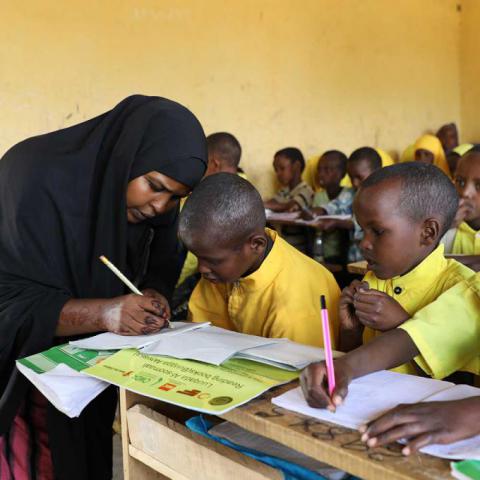
“I love coming to school because I like to learn new things,” said Ali, an 11-year-old boy who attends school at Chamuk primary school in Moyale Woreda, Dawa zone, Somali region of Ethiopia.
Ali was born a healthy baby but fell ill when he was 18- months- old. His parents took him to health centers but the causes of his illness were not known. Since then Ali has been living with a physical impairment and mild mental challenges. Because he cannot move his hand and legs easily and has difficulty s expressing ideas, some children teased him.
“I never have difficulty in making new friends even though some kids have a bad attitude towards me because of the way I am,” said Ali. Ali enjoys playing with his friends during the school breaks and on weekends. Ali’s favorite game is a role-playing game where they imitate traditional weddings. He likes to play as a father of the bride who prepares the banquet.
Ali lives with his stepmother and five siblings in Chamuk IDP sites. He wakes up early in the morning to prepare for school. “If breakfast is available, my favorite is chapati with tea,” he says. Ali’s home is near Chamuk primary school and he began school last year (2020) in KG class. This is his first year attending the first grade. “I love Alia as my own son. I spend more time with him because he needs all-rounded care including psychological, physical, and moral support. He has made good progress since he began school last year,” says Ferhiya Ali’s stepmother. Ferhiya is raising her two stepchildren with three daughters of her own. Ali’s family lost everything they have including their house due to the conflict that occurred three years ago. Before the conflict, Ali’s father used to be a camel market dealer for rich camel owners. Ali’s father now lives in Nairobi employed in a boutique as a shopkeeper. He sends 2,500 Birr ($53) per month to support his family.
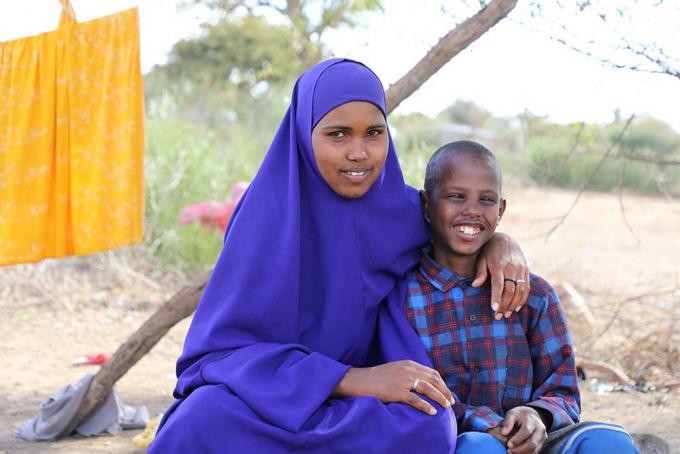
“After the conflict, life has been very hard for my family. We have serious water shortage in our community. I have to travel two hours and line up for hours until my turn comes to fetch water. Everything is getting expensive. It is challenging to provide all the basic things to Ali and his siblings, says Ferhiya.
Ali knows that his family does not make enough money to provide for all his needs.
“I wish my parents owned a big shop in our neighborhood so they can get money to buy shoes, clothing, and food for myself and my siblings,” he said
Ali never likes to miss class. But sometimes he has chest pain.
“Ali needs a medical checkup on his general condition but we do not have enough money to take him to the health centers in the town.”Says Ferhiya.
Ferhiya regrets marrying at a young age before completing her education.
“I wish all my children finish their education and get professional work so they can lead a good life. I will do everything I can so they can achieve good academic results in their education. I will support Ali in his assignments and help him with what he learned at school. I will do my best to give him all the extra time he needs,” she added
Ali says, “When I grow up, I want to be a teacher for children living with disabilities. Seeing myself I believe those children need education and more care. I also want to own a big shop so I will have a good source of income to provide for my needs.”
In Chamuk primary school, there are 1,392 students. Of these students, 24 children living with disabilities are attending school in the regular classes. Ali received school materials such as exercise books, pencils, rubber and pencil sharpener through ECW MYRP.
With the support from Education Cannot Wait facilitated Multi-Year Resilience Program, training for the teachers on psychosocial support, daily lesson planning, techniques on teaching children living with disabilities, and other related training were provided to enhance the capacity of teachers in the targeted schools.
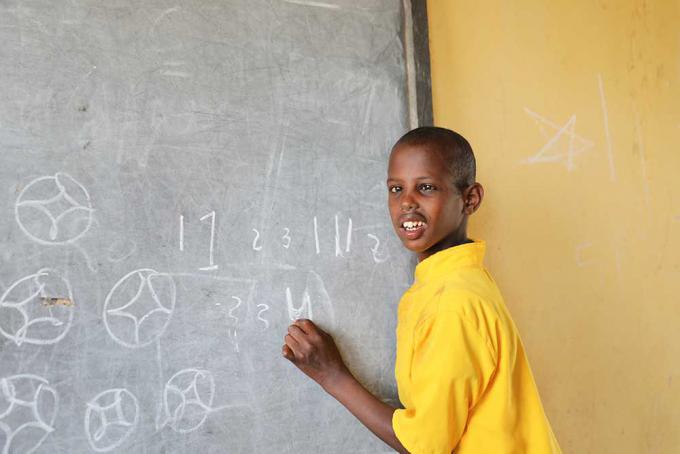
Decko is Ali’s teacher and one of the five female teachers in Chamuk primary school. She has received all the training provided with the support of the program.
“Here in Chamuk primary school, I appreciate these program’s efforts in encouraging female teachers and providing training to enhance our teaching skills. I have taken all the trainings and gained more knowledge and skills. The training was also important in terms of understanding and supporting children like Ali. Ali is a confident boy who always asks questions. During class and after class, I give extra time for him so he can understand the lessons well.”
Decko believes that if Ali receives close follow-up and support from the school and his parents, he can get good academic results like his classmates.
“It would be beneficial if students like Ali get educational toys which will help them to understand language and math lessons.” Said Decko.
Kadijah is a member of the Chamuk primary school Parent Teacher Association (PTA). She has been a PTA member for the past 30 years. “Even though I am illiterate, I have sent all my children to school and currently three of them are professional employees working in government and private offices. Now seeing the achievement of my children I am motivated to contribute more as a PTA member for my community,” said Kadijah.
Kadijah has received various training which includes promoting school hygiene and sanitation and encouraging partners to send their children to school especially children living with disabilities.
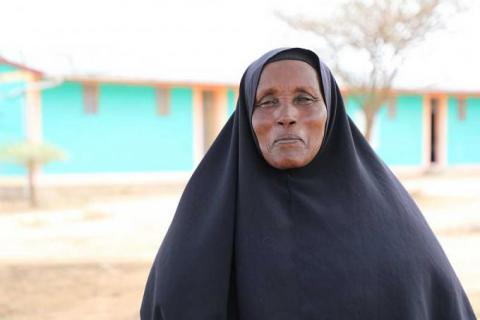
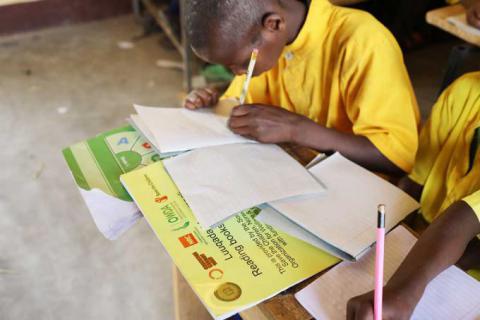
Kadijah was one of the PTA members who provided counseling for Ferhiya, Ali’s stepmother. “Ali is one of the fruits of our work. I closely follow up on his performance at school. In general, the community is hesitant to send their children to school due to the present economic and social condition of the community. But the school feeding program run by this program is encouraging parents to send their children to school,” said Kadijah.
About the program
The Education Cannot Wait facilitated Multi-Year Resilience Program (ECW MYRP) is a three-year program aiming to improve learning through equitable access, crisis-sensitive, and quality education for emergency-affected children including children living with disabilities. The required total budget is 165 million USD with a plan to implement in Afar, Amhara, Benishangul-Gumz, Harari, Oromia, SNNP, Somali, and Tigray regions. Currently, ECW MYRP is implemented though 27 million USD seed funding from Education Cannot Wait (ECW) initially focuses interventions on addressing the critical educational needs of 60,487 out of school-displaced children in 81 schools, 17 woredas of Amhara, Oromia, and Somali regions. Part of the seed money will support efforts to mobilize the funding gap of US$138 million needed for the whole program.
Save the Children, NRC, and OWDA are implementing ECW MYRP in Fafan, Dawa, Korahey, and Liben zones of the Somali region since the program implementation started in January 2021. The following are some of the achievements of the program in the Somali region.
- Temporary learning spaces were constructed in most targeted schools.
- The school feeding program is running in most targeted schools.
- Gender segregated latrines were rehabilitated in most targeted schools.
- Roof water catchment and rain harvest system with water containers with the capacity of 10,000 liters were installed in most targeted schools.
- Psychosocial, literacy & numeracy, techniques of daily lesson planning, and supporting children living with disabilities training was provided for teachers in most targeted schools.
- Training on school hygiene and sanitation, awareness creation techniques on the benefits of education including for children living with disabilities were provided for PTA members in most targeted schools.
- Students received learning materials like exercise books, pencils and pens in most targeted schools.
- Girls received dignity kits in most targeted schools.
- During the summer break, remedial classes were provided for selected students in most targeted schools.
- School reading clubs were established in most targeted schools to enhance the reading capacity of students.
- School WASH clubs were established to promote hygiene and sanitation in most targeted schools.
 Ethiopia
Ethiopia